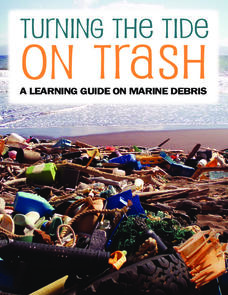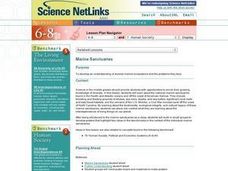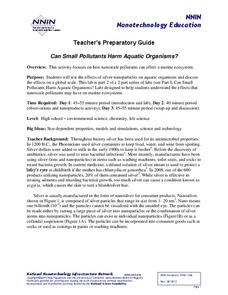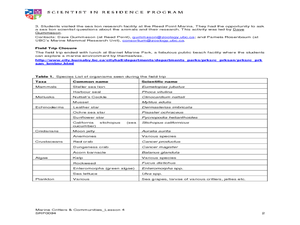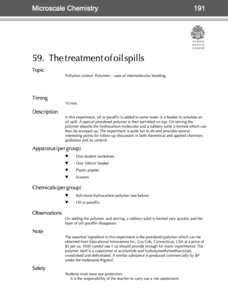NOAA
Turning the Tide on Trash: A Learning Guide on Marine Debris
The lessons in this learning guide are designed to increase youngsters' awareness of the impacts of marine debris and to teach them about pollution prevention techniques. This fabulous, 30-page packet is chock full of important...
Curated OER
National Marine Sanctuaries Fish
Information is provided on Gray's Reef, Florida Keys, and Flower Garden Banks marine sanctuaries. Young marine biologists then visit the FishBase and REEF databases to collect fish species information for each location. They then...
Curated OER
Marine Sanctuaries
Middle schoolers delve into diverse marine ecosystems and the problems they face. They discover students the national marine sanctuaries found in the Pacific and Atlantic oceans and off the coast of American Samoa.
Sargent Art
Protect Our Marine Life
Encourage water conservation and boost art skills with a hands-on activity that challenges young painters to create a scene highlighting marine life. Using oil pastels, scholars draw an underwater scene and write a tip for viewers to...
Curated OER
Marine Debris
Now is the time to educate tomorrow's citizens to care for the planet, and here is a lesson to help facilitate the process. Collect some marine debris and bring it into class. Have your class separate it into types and then test each...
NOAA
Ocean Acidification
If tap water is more acidic than ocean water, why are we so concerned about ocean acidification? The third installment of a 23-part NOAA Enrichment in Marine sciences and Oceanography (NEMO) program focuses on carbon dioxide levels in...
Curated OER
Marine Debris
Students perform experiments to examine if debris float, or blow in the wind. The effects of these characteristics on the marine debris are then discussed. They determine how a material can influence what becomes marine debris.
Ask a Biologist
It’s a Plankton Eat Plankton World
For as small as they are, plankton sure play an enormous role in maintaining marine ecosystems. Dive into an investigation of these tiny organisms with a hands-on life science activity in which children cut out pictures of sea...
Curated OER
Endangered Marine Turtles
Students work in groups and experience what it is like to be a hatchling marine turtle by playing a board game. In this endangered marine turtles instructional activity, students research the threats to marine turtle hatchlings....
NOAA
Introduction to the Ocean Sciences
Engage your class with a mock National Ocean Sciences Bowl. The first installment of a 23-part NOAA Enrichment in Marine sciences and Oceanography (NEMO) program provides an introduction to the ocean sciences, as well as to the rules of...
NOAA
Watch the Screen!
Can a sponge cure cancer? Life science pupils visit the drugstore under the sea in the fifth instructional activity of six. Working groups research the topic then get hands-on experience by testing the inhibiting effects of several...
National Nanotechnology Infrastructure Network
Can Small Pollutants Harm Aquatic Organisms?
Nanoparticles have toxic effects on plant and animal life—even though you can't see them. The second lesson plan of a two-part series has young scientists conduct an experiment that exposes plant and animals to nanoparticle pollutants....
Kenan Fellows
The Effects of Environmental Conditions on Aquatic Organisms
What kind of experiment can your class do to how observe the environment effects on organisms? Groups design and conduct lab experiments to learn about the effects of the environment on aquatic organisms. Based upon knowledge gained...
Curated OER
Ocean Life
Students explore the topics of ocean water salinity, ocean life zones, marine life classification, and ocean food chains. They observe demonstrations, conduct experiments, complete quizzes and handouts, and analyze key vocabulary.
Curated OER
Types of Marine Debris
Students conduct an experiment. In this marine debris and environment protection activity, students categorize trash into piles, predict whether these trash items will sink, float or be picked up and carried by the wind and then...
Curated OER
Marine Life Research and Persuasive Conservation Pamphlet
Tenth graders examine conservation and research a type of fish that is under environmental stress. In this conservation lesson students create a pamphlet about the conservation of a marine organism.
Curated OER
Marine Critters and Communities
Students touch, see, smell, and hear marine animals that live in a marina. In this marine animals lesson plan, students take field trip to a marine environment after studying the animals.
Curated OER
Effects of Oil Spills on Environment and Marine Life
Students explore oceanography by conducting an environmental experiment in class. In this oil spill lesson, students discuss the human need for oil and what is at stake when we drill for oil in our oceans. Students read a book in class...
Science Matters
Blubber Gloves: It’s All About Insulation
Instill the concept of adaptation with the help of Blubber Gloves—ziplock bags, shortening, and duct tape. Scholars discuss how animals and plants keep warm in polar regions, record their predictions, and try on their Blubber Gloves to...
Royal Society of Chemistry
The Treatment of Oil Spills—Microscale Chemistry
When oil spills happen, how is the oil cleaned up? Pupils of polymer science discover an amazing substance that turns oil into a solid during a microscale experiment. Individuals observe oil or paraffin before and after addition of the...
Curated OER
The Impact of Fishing
Students explore the concept of fishing as it relates to oceans and how some fishing practices can damage the health of the marine ecosystems. In this lesson on the impact of fishing, students research the many places in the world where...
Curated OER
Fish Tales
Have your class learn about marine life. Learners write a story about a fish, create an art project, and share their work with the class. This experience could be enhanced by having them conduct Internet research to discover some of the...
Curated OER
Teaching about the Effect of pH on Aquatic Organisms
Learners perform experiments to determine the PH, acidity, and buffering qualities of a lake that make them sensitive to acid deposition.
Curated OER
Marine Habitats of Galveston Island
Four lessons introduce elementary ecologists to salt marsh and sandy beach habitats. In the first lesson, they place shells and other materials in vinegar to determine if they contain calcium carbonate. In the second lesson, they read a...


